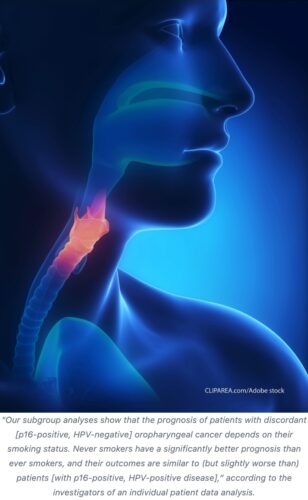Source: www.cancernetwork.com
Author: Russ Conroy
Human papillomavirus and p16 discordance may correlate with a worse prognosis for oropharyngeal cancer, according to data from an individual patient data analysis.
Patients with discordant p16-negative, human papillomavirus (HPV)–positive or p16-positive, HPV-negative oropharyngeal cancer had a significantly worse prognosis compared with patients who had p16-positive and HPV-positive disease and a better prognosis compared with those who have p16-negative and HPV-negative disease. The data suggest the need for routine p16 immunohistochemistry and mandated HPV testing in clinical trials for oropharyngeal cancer, according to findings from the HNCIG-EPIC-OPC individual patient data analysis.
The 5-year overall survival (OS) rate was 81.1% (95% CI, 79.5%-82.7%) for patients with p16-positive, HPV-positive disease; 40.4% (95% CI, 38.6%-42.4%) for those with p16-negative, HPV-negative disease; 53.2% (95% CI, 46.6%-60.8%) for those with p16-negative, HPV-positive disease; and 54.7% (95% CI, 49.2%-60.9%) for those with p16-positive, HPV-negative disease. Additionally, 5-year disease-free survival (DFS) was 84.3% (95% CI, 82.9%-85.7%), 60.8% (95% CI, 58.8%-62.9%), 71.1% (95% CI, 64.7%-78.2%), and 67.9% (95% CI, 62.5%-73.7%) for each respective patient group.
Investigators of this multi-center, international individual patient data analysis included retrospective and prospective cohorts with a minimum size of at least 100 patients with primary squamous cell carcinoma of the oropharynx. Patients underwent cross-sectional imaging; histological confirmation by biopsy; and treatment with surgery, radiotherapy, chemotherapy, or combination therapy for oropharyngeal cancer.
The primary end points of the analysis included OS, DFS, and the proportion of patients in the overall cohort who showed different p16 and HPV result combinations.
Patients with a diagnosis of a primary squamous cell carcinoma of oropharyngeal cancer, and data on p16 immunohistochemistry and HPV testing were included in the analysis. Additional inclusion criteria included having information on age, sex, and alcohol and tobacco use; disease stage per tumor-node-metastasis (TNM); information on treatments received; and data on clinical outcomes and follow-ups.
Across 13 eligible studies, investigators assessed a total of 7654 patients with oropharyngeal cancer who had available p16 and HPV data. The median patient age was 60.0 years (interquartile range, 53.0-67.0), 74.7% of patients were male, and 76.5% were current or former smokers. A total 78.8% of patients had locally advanced disease.
In the overall patient population, 46.5% had p16-negative, HPV-negative disease; 44.3% had p16-positive, HPV-positive disease; 3.8% had p16-negative, HPV-positive disease; and 5.4% had p16-positive, HPV-negative disease. The proportion of patients with p16-negative, HPV-positive disease differed significantly by geographical region and was highest in areas with the lowest HPV-attributable fractions (r = –0.744; P = .0035).
Of note, the rates of HPV negativity among patients with p16-positive disease were lower in those with tumors of the tonsil and base of the tongue (9.0%) compared with those who had tumors in other subsites (29.7%; P <.0001). The rate of patients with p16-negative, HPV-positive disease was 8.4% for those with tumors of the tonsil and base of the tongue and 6.1% for those with tumors in other subsites (P <.0001). Investigators noted that a higher proportion of non-drinkers and never-smokers had p16-positive and HPV-positive disease than in any other group, and a greater proportion of ever-smokers and alcohol drinkers had p16-negative, HPV-negative disease than in any other group. “…Our subgroup analyses show that the prognosis of patients with discordant [p16-positive, HPV-negative] oropharyngeal cancer depends on their smoking status. Never smokers have a significantly better prognosis than ever smokers, and their outcomes are similar to (but slightly worse than) patients [with p16-positive, HPV-positive disease],” the study authors stated.
Reference
Mehanna H, Taberna M, von Buchwald C, et al. Prognostic implications of p16 and HPV discordance in oropharyngeal cancer (HNCIG-EPIC-OPC): a multicentre, multinational, individual patient data analysis. Lancet Oncol. Published online February 13, 2023. doi:10.1016/S1470-2045(23)00013-X


Leave A Comment
You must be logged in to post a comment.